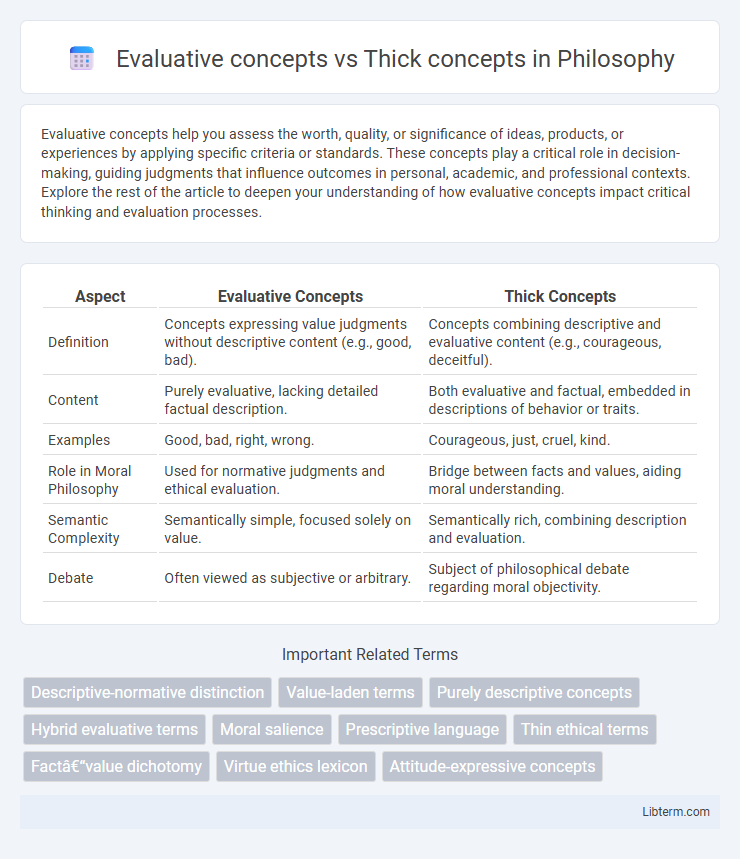Evaluative concepts help you assess the worth, quality, or significance of ideas, products, or experiences by applying specific criteria or standards. These concepts play a critical role in decision-making, guiding judgments that influence outcomes in personal, academic, and professional contexts. Explore the rest of the article to deepen your understanding of how evaluative concepts impact critical thinking and evaluation processes.
Table of Comparison
| Aspect | Evaluative Concepts | Thick Concepts |
|---|---|---|
| Definition | Concepts expressing value judgments without descriptive content (e.g., good, bad). | Concepts combining descriptive and evaluative content (e.g., courageous, deceitful). |
| Content | Purely evaluative, lacking detailed factual description. | Both evaluative and factual, embedded in descriptions of behavior or traits. |
| Examples | Good, bad, right, wrong. | Courageous, just, cruel, kind. |
| Role in Moral Philosophy | Used for normative judgments and ethical evaluation. | Bridge between facts and values, aiding moral understanding. |
| Semantic Complexity | Semantically simple, focused solely on value. | Semantically rich, combining description and evaluation. |
| Debate | Often viewed as subjective or arbitrary. | Subject of philosophical debate regarding moral objectivity. |
Introduction to Evaluative and Thick Concepts
Evaluative concepts express value judgments, such as "good," "bad," or "just," directly influencing moral assessments and decision-making processes. Thick concepts combine descriptive and evaluative elements, exemplified by terms like "courageous" or "cruel," which convey both factual information and ethical evaluation. Understanding the distinction between evaluative and thick concepts is essential for analyzing moral language and ethical reasoning in philosophy.
Defining Evaluative Concepts
Evaluative concepts are normative terms that express value judgments, such as "good," "wrong," or "just," and inherently combine descriptive and evaluative aspects. These concepts function both to describe states of affairs and to appraise them morally or aesthetically, making them central to ethical theory and discourse. Unlike thick concepts, which integrate rich descriptive content with evaluative meaning, defining evaluative concepts involves isolating the pure normative dimension that guides moral reasoning and decision-making.
Understanding Thick Concepts
Thick concepts combine descriptive and evaluative components, enabling deeper understanding of human practices by capturing both factual details and moral significance. Unlike purely evaluative concepts that express approval or disapproval without detailed content, thick concepts provide rich, context-dependent meanings which reveal norms and guide behavior. Understanding thick concepts is crucial in philosophy and ethics for analyzing complex social and cultural phenomena where values and facts intersect.
Key Differences Between Evaluative and Thick Concepts
Evaluative concepts express value judgments solely based on approval or disapproval, such as "good" or "bad," without detailed descriptive content. Thick concepts combine both evaluative and descriptive elements, embedding moral or value-laden meaning within rich factual context, exemplified by terms like "courageous" or "cruel." The key difference lies in thick concepts providing substantive information about actions or traits alongside evaluative judgment, whereas evaluative concepts primarily convey a simple assessment.
The Role of Language in Shaping Concepts
Evaluative concepts embed normative judgments within their meaning, influencing how individuals interpret behaviors and social practices through language. Thick concepts combine descriptive and evaluative elements, allowing language to simultaneously convey factual information and moral assessment, thereby shaping conceptual understanding contextually. The dynamic interplay of language in expressing these concepts facilitates nuanced communication that reflects both the factual and ethical dimensions of experience.
Examples of Thick Concepts in Ethics
Thick concepts in ethics blend descriptive content with evaluative judgment, such as "brave," "cruel," and "generous," which simultaneously describe actions and convey moral approval or disapproval. These concepts differ from purely evaluative terms like "good" or "bad" by providing rich contextual details alongside ethical evaluation. Understanding thick concepts helps clarify moral reasoning by linking factual descriptions to normative assessments in ethical discourse.
Philosophical Significance of Evaluative Concepts
Evaluative concepts play a crucial role in ethical philosophy by enabling judgments about right and wrong, good and bad, which guide moral reasoning and decision-making. Unlike thick concepts that combine descriptive and evaluative content, evaluative concepts primarily express normative assessments without detailed empirical description. Their philosophical significance lies in shaping normative frameworks, influencing discourse on value theory, and underpinning debates about objectivity and subjectivity in morality.
Criticisms and Debates Surrounding Thick Concepts
Thick concepts combine descriptive and evaluative elements, leading to debates on whether their evaluative aspect can be objectively analyzed or if it introduces subjective bias into moral philosophy. Critics argue thick concepts challenge the clear separation between facts and values, complicating ethical discourse and assessment. These criticisms highlight ongoing disputes regarding the interpretation and application of thick concepts in normative evaluations.
Practical Implications in Moral Reasoning
Evaluative concepts like "good" or "bad" directly influence moral judgments by offering clear value assessments, while thick concepts such as "courageous" or "cruel" combine descriptive content with evaluative meaning, shaping both understanding and action. In practical moral reasoning, thick concepts enable nuanced deliberation by providing rich context that guides behavior beyond simple approval or disapproval. This dual function enhances moral reflection and decision-making in real-world ethical situations by integrating facts and values.
Conclusion: Integrating Evaluative and Thick Concepts
Integrating evaluative and thick concepts deepens ethical understanding by combining moral judgments with descriptive content, allowing for richer interpretation of actions and behaviors. Evaluative concepts emphasize value-laden assessments, while thick concepts bridge these assessments with concrete specifics, facilitating nuanced ethical analysis. This synthesis enhances practical reasoning and moral discourse by grounding evaluative claims in detailed contextual information.
Evaluative concepts Infographic

 libterm.com
libterm.com